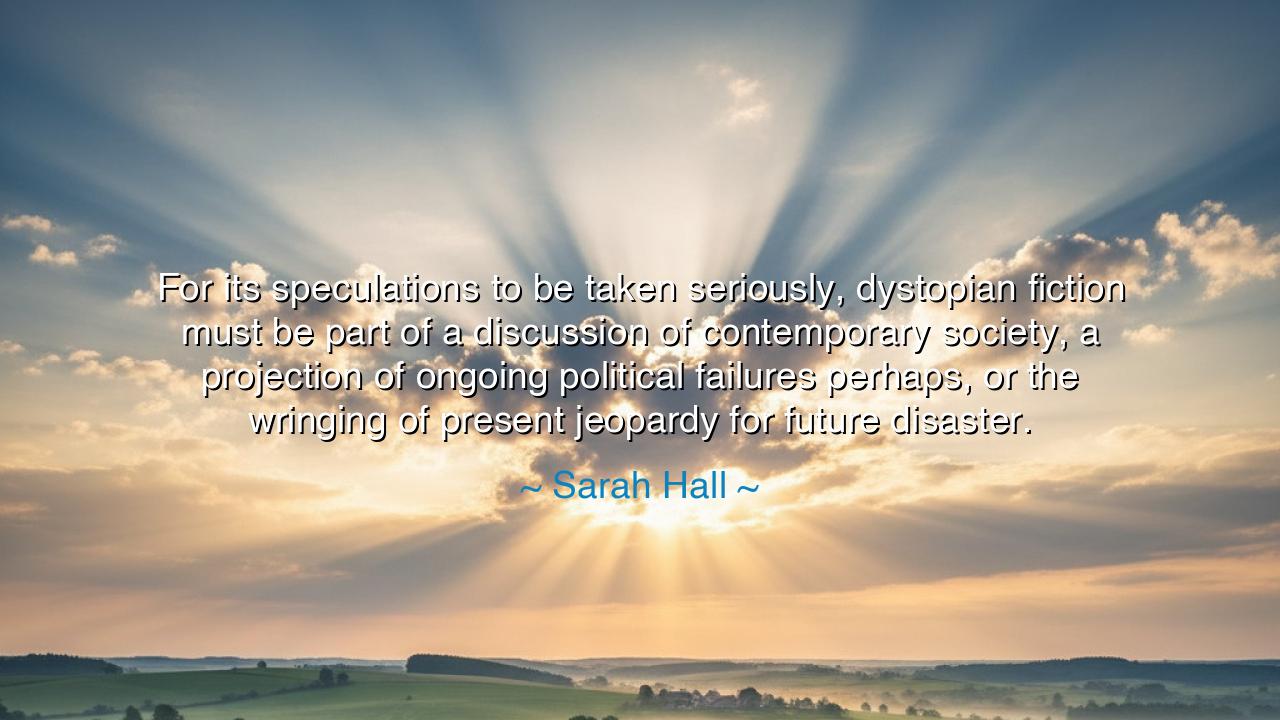
For its speculations to be taken seriously, dystopian fiction
For its speculations to be taken seriously, dystopian fiction must be part of a discussion of contemporary society, a projection of ongoing political failures perhaps, or the wringing of present jeopardy for future disaster.






In the ancient traditions of storytelling, prophecy and warning have always played central roles in shaping the course of human history. Sarah Hall’s words, “For its speculations to be taken seriously, dystopian fiction must be part of a discussion of contemporary society, a projection of ongoing political failures perhaps, or the wringing of present jeopardy for future disaster,” illuminate a deep truth: the most compelling works of fiction are those that resonate with the truths of their time. Dystopian fiction, by its very nature, reflects the fears and concerns of the present, using the future as a canvas to explore the consequences of contemporary decisions. It serves as a mirror to society, showing us not only the darkest possibilities of our current path but also the potential consequences if we fail to address the problems of today.
The ancient Greeks understood the power of speculation and prophecy, particularly in their tragic plays, which often sought to reflect on the dangers of hubris and the consequences of unchecked power. Sophocles, in his tragedy Oedipus Rex, famously depicted a world in which the prophecies of the gods unfold with inevitable certainty, showing how the flaws of individuals—and their refusal to recognize their own limitations—lead to catastrophic outcomes. Oedipus’s downfall is not merely a fate dictated by the gods, but a result of society’s failure to heed warnings and acknowledge the dangers inherent in their actions. This echoes Hall’s assertion that dystopian fiction must serve as a warning, offering a projection of present-day failures and the potential for those failures to lead to disaster in the future.
In the Roman Empire, civic discourse often revolved around the ethical implications of governance. The great philosopher Cicero warned against the concentration of power and the dangers of a corrupt state. In his writings, Cicero foresaw that the decline of the Republic was rooted not only in political corruption but in the moral decay of its leaders and citizens. Much like dystopian fiction today, Cicero’s work served as a mirror to the failing system around him, urging his contemporaries to take action before the collapse became inevitable. Dystopian fiction, in this sense, serves as a reflection of the current political climate, making the warnings clear and showing the potential for the world to spiral into a dark future if present injustices are not addressed.
One of the most enduring examples of dystopian literature that draws directly from contemporary concerns is George Orwell’s "1984", a scathing critique of totalitarian regimes and the dangers of government overreach. Written in the aftermath of World War II, Orwell’s novel was not merely an exploration of an imagined future, but a reflection of the political fears of his time. The totalitarian regime depicted in Orwell’s work was a projection of present-day dangers, shaped by the horrors of war and the rise of oppressive states like Nazi Germany and the Soviet Union. Orwell’s speculations were meant to be taken seriously because they were grounded in the very political realities of his era, warning of the consequences of unchecked power and the loss of personal freedom.
Margaret Atwood’s "The Handmaid's Tale" serves as another example of dystopian fiction that reflects contemporary society and the potential consequences of social injustice. Atwood’s vision of a future where women are subjugated by a totalitarian religious regime is deeply connected to the feminist and civil rights movements of her time. The novel is not a mere fictional narrative but a critique of the ways in which societies can slide into oppression and injustice if people become complacent and fail to challenge discriminatory systems. Atwood’s work, much like Orwell’s, forces readers to confront the darkness that lurks in the present and to recognize that the seeds of future dystopia can often be found in the injustices of today.
The lesson we must take from Hall’s reflection is that the power of dystopian fiction lies not in its fantastical elements, but in its ability to reflect and comment on the real world. These stories are not just warnings of things that could happen in some far-off future—they are calls to action, **inviting us to confront the flaws and failures of our own time. Like the great philosophers, poets, and writers of the past, dystopian writers act as prophets, using the lens of fiction to reveal uncomfortable truths and push society to confront the consequences of its actions. Just as Socrates used his dialogue to question the status quo, so too must we engage with dystopian works as warnings, paying heed to their lessons and reflecting on how we can change course before it is too late.
In our own lives, let us embrace the warnings embedded in literature and art. The present holds within it the seeds of the future, and our responsibility is to acknowledge the potential consequences of our actions today. Whether in politics, social movements, or personal decisions, we must be aware of the paths we are walking and recognize the power we have to shape the world for future generations. As we read and reflect on dystopian fiction, let it serve not as a prediction, but as a reminder that the future is shaped by the choices we make in the present. Just as the ancient prophets warned of the consequences of unchecked power, we too must be vigilant and proactive, ensuring that we do not walk blindly into a future shaped by disaster.






AAdministratorAdministrator
Welcome, honored guests. Please leave a comment, we will respond soon